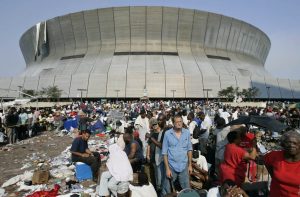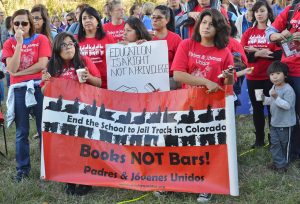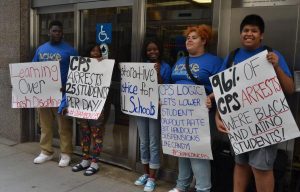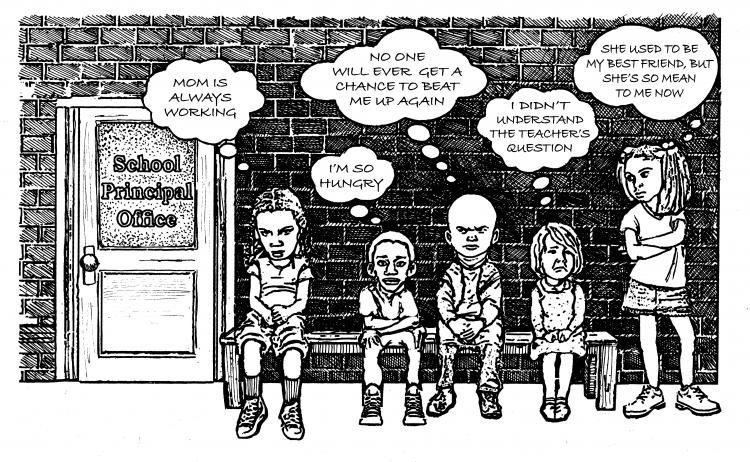How are communities choosing to combat the effects of trauma in youth and schools? Who is doing this organizing?
New Orleans

http://theconversation.com/still-waiting-for-help-the-lessons-of-hurricane-katrina-on-poverty-46666
In New Orleans, much of the community organizing is centered around rebuilding, whether that is physically rebuilding dilapidated parts of New Orleans, rebuilding relationships among community members, or rebuilding positive opportunities in young people’s lives.
The Center for Restorative Approaches (The CRA) and Community Mediation Services (CMS) are both organizations run by members of the Greater New Orleans Community seeking to work toward healthy relationships between different parts of their community. They often work with school communities specifically to help resolve issues between teachers and administrators and parents and administrators. They operate under the theory that if school administrations can better understand the communities they serve, they will develop discipline policies that can facilitate learning rather than alienate students from their own education. These two organizations focus on letting feedback for schools come directly from the community in a mediated setting.
Café Reconcile is a program that gives historically marginalized youth a chance to build career skills while working on ways to contribute positively to their communities. The young people in this program often have had trouble staying in school due to discipline issues, and Café Reconcile offers them a space to come to terms with what they can offer their communities and how they can build a future for themselves.
Similarly, Youth Rebuilding New Orleans (YRNO) offers New Orleans a positive outlet to learn how they can contribute to their community. YRNO is entirely student-run and they coordinate volunteer labor to help rebuild decimated areas of New Orleans. Some of the trauma that NOLA students deal with comes from the aftermath of Hurricane Katrina and the instability that comes from losing a home. YRNO seeks to combat the neighborhood decay that young people experience by rebuilding houses in these lost areas.
Communities across the US

https://www.flickr.com/photos/desrowvisuals/15426779966
When the scope is broadened to organizing in cities across the country, more types of organizing appear around conscientious school discipline and trauma treatment.
In the Denver area, Padres y Jóvenes Unidos unites students and parents in efforts to address issues facing the Latinx community. A large component of their organizing is concerned with equitable access to educational opportunities, and within that, Padres y Jóvenes Unidos leads a robust fight against the school-to-prison pipeline. Part of this fight is a movement to reform discipline in schools, where it is widely recognized that this pipeline originates for many students. Padres y Jóvenes Unidos has completely transformed the Latinx community’s relationship with their schools and has built a significant parent army that vehemently advocates for their children’s education, and by extension, their children’s futures.
A type of organizing seen on the national and local scale is the alliance. Locally in Richmond, Virginia, Greater Richmond Trauma-Informed Community Network connects schools and community members to trauma treatment resources as well as offers information on conscientious school discipline and responding to trauma in children. Nationally, the Dignity in Schools Campaign is an alliance of different grassroots organizations connected by their dedication to finding alternatives to no-excuses discipline policies. Alliances are quite powerful tools in community organizing, as they create new communities who are all working towards a common goal, but may not otherwise be in contact.
Some of the most powerful and quickly-growing organizing in cities across the country are student-run campaigns. The Ohio Student Association (OSA) is a student organizing group that connects students from urban areas in Ohio in efforts to grow their power as an advocating body. Some of their most pointed efforts are aimed at ending zero-tolerance discipline and criminalization of high school students. In Chicago, there are the student-led Youth Justice Program of STOP (Southside Together Organizing for Power) and VOYCE: Voices of Youth in Chicago Education. Both of these groups are attacking the treatment of youth in poor areas of Chicago, specifically their criminalization. In addition to running campaigns for restorative discipline in schools, VOYCE members have drafted proposed legislation that holds schools to a higher discipline standard than currently exists. Youth involved in all three of these groups become deeply connected to their communities and feel driven to enact positive change for the communities that raised them.
Challenges

http://www.progressillinois.com/posts/content/2014/07/23/chicago-board-ed-approves-budget-debate-over-school-funding-rages
All of these organizations, regardless of where they are and who they organize, are challenged by the mere fact that they are challenging the status quo. Most of the powerful voices in this country agree that the best way to educate historically marginalized communities is with strict discipline. Breaking down that dangerous and condescending rhetoric is difficult and organizations seeking to do just that meet challenges such as lack of funds, resistance from legislators, and lack of social support.
The organizations run by youth specifically meet the added challenge of trying to enact lasting change as young people. Youth are commonly disregarded and as being too naïve to understand what is “good for them”. Instead of regarding them as future leaders and innovators, many facets of society think of youth as less than full citizens, even when they can successfully and constructively organize amongst themselves for issues they care about.
